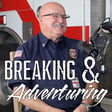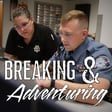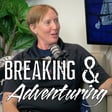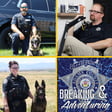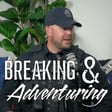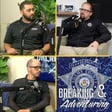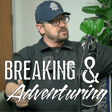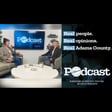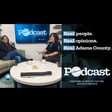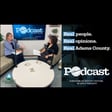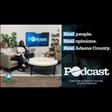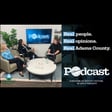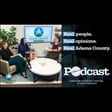Become a Creator today!Start creating today - Share your story with the world!
Start for free
00:00:00
00:00:01

Episode 9 - Communicating in a Crisis
In a crisis, clear and timely communication is essential to public safety. In this episode, Sgt. Adam Sherman is joined by Detective Dave Snelling of the Arvada Police Department and Dionne Ward of the Boulder Police Department—both serving as public information officers for their agencies. They discuss how they navigate the critical task of releasing information during high-stakes incidents like mass shootings, while also safeguarding the privacy and dignity of those affected. From coordinating with command staff to managing media pressure, they shed light on the delicate balance between transparency and compassion in the midst of tragedy.
Do you have questions? We want to answer them. Send us an email to CommunityConnections@adcogov.org.
Recommended
Transcript
Introduction to 'Breaking and Adventuring' and Guests
00:00:22
Speaker
All right. Welcome back to another episode of Breaking and Adventuring, a podcast where we invite you into the world of the Adams County Sheriff's Office and beyond. So we're going to share the background, stories, experiences of the men and women of the Adams County Sheriff's Office.
00:00:35
Speaker
Stop. Don't look at me like that. And the greater law enforcement and public safety community. I flubbed already. I know. That was bad.
Backgrounds in Public Safety and Crisis Communications
00:00:42
Speaker
So I'm your host, Sergeant Adam Sherman, and today we're visiting with my friends, Detective Dave Snelling and Dionne Wall. So Dave is with the Arvada Police Department, and Dionne is with the Boulder Police Department.
00:00:54
Speaker
And they are going to talk to us a little bit about their experience with crisis communications and how important that is to our communities and for public safety as a whole. So we'll start with backgrounds. You're only two friends?
00:01:07
Speaker
Did I only... You have more than two, please. Two and a half. Okay. There's good start. There's a, there's an acquaintance running around somewhere. ah So, uh, if you want to just tell us a little about yourselves and how you got to where you are in the world of public safety and public information, Dion, you want to go first?
Transition from Journalism to Public Information Officer
00:01:25
Speaker
Yes, Adam, I would love to go first. Thank you. Inside joke. She begged me to let Dave go first. Opportunity. That's all right. I'm i'm cooler than Dave. I'll go first. oh very good. So I started off my career as a newspaper journalist.
00:01:37
Speaker
Okay. And that's what I wanted to do ever since, gosh, I was like 12 years old. Love the writing, love just kind of telling stories, um using the written word. And then as I got older, I kind of realized I actually needed to make a living.
00:01:49
Speaker
And so I jumped to the PIO side of things, worked for an agency back east, and then came out here, worked for the Jeffco Sheriff's Office, just doing solely social media and then some media. And then I started working for the city of Boulder just over about four and a half years ago.
00:02:04
Speaker
PIO embedded in the police department there. And it's been nonstop ever since. Yeah, there' things happen occasionally around there. you Major university, large population, area. So every now and again, you have to deal with some stuff.
00:02:20
Speaker
What about you, sir? I've been around for a little while. What? so Yeah, I know, right? Hard to tell. oh you I'm actually only 30. Law enforcement is a tough job.
00:02:31
Speaker
It is. It really wears on you. i I looked much younger until seven years ago when I started PIO work, but... I've been a cop now for almost 33 years, and I've been assigned to public information for going on seven.
00:02:47
Speaker
Okay. So, yeah, it's been interesting. I've loved every minute of my career, and I can definitely say every assignment I've had from one to the other has been increasingly more difficult.
00:03:00
Speaker
Yeah. And especially being a public information person and having to share with your community all the information starting in 2018, 19, things got a little dicey and more difficult and people were much more critical.
00:03:15
Speaker
And yeah, a lot's happened in seven years. Yeah. and And being able to make it digestible for your public. Cause I know ah least from the law enforcement perspective, using your career and your knowledge and experience,
00:03:29
Speaker
but try to have you how to formulate that so you can get your information out.
Blending Journalism and Law Enforcement
00:03:33
Speaker
And then also having perspective from the journalism side of how to better do that. I think, you know, from our little PIO public information community, it's ah it's a good blend to have a little bit of both and backgrounds um to be able to get that done. But...
00:03:46
Speaker
Oh, absolutely. And I, it's, you know, I learned from people like Dion all the time how to not talk like a cop. Yeah. ah Because a lot of people don't, they don't understand, you know, the certain terms we have for things and it doesn't translate well. Yeah. It doesn't translate well into other languages.
00:04:02
Speaker
Yeah. Actually. So it's been really helpful to know people like Dion and some others that, especially in that media background and then learning the blend of media and law enforcement, it makes us be able to, it's nice to deliver a message in a critical moment when community members are stressed.
Balancing Transparency and Privacy in Crisis Communication
00:04:21
Speaker
Yeah.
00:04:21
Speaker
Yeah. And you have to give them those action items like, no, no, here's what I need you to do or what you need to know. Well, we'll, so a little bit about your careers and how you got to where you are. So what is a PIO to you and what are some of those primary responsibilities for your agencies?
00:04:37
Speaker
but That's a great question. So, and i would thank you on a couple of that, I can't believe you wrote it. Somebody else did. It's a crayon. You know, it's really important. we We talk about transparency and getting information out.
00:04:49
Speaker
All of that stuff is important, but it's important to talk to the folks that that pay your paycheck, you know, the people that pay taxes, they want to know where their money's going. They want to know what their cops are doing. And they want to know that when their cops don't do well or do the wrong thing, that they're accountable and that we're making sure we're doing everything we can to keep a community safe. And I mean,
00:05:14
Speaker
To share information out is incredibly difficult because there's also times where we can't share information. And it's so hard to explain to somebody in the community, hey, you know what, this is a mental health case or this is involving juveniles.
00:05:31
Speaker
We can't share that with you right now. Or the biggest thing that I've found and one of the hardest things is dealing with and making sure victims are taken care of. I think the component when people want to point a finger at a police department or get information from a police department, we may be missing that there's a victim involved here and they are priority one.
00:05:55
Speaker
Absolutely. So I think that is mainly my job and burying that out and, and finding the right balance between notifying the community of a murder and making sure the family has been notified that their loved one's dead.
00:06:09
Speaker
Yeah. and And it's a blend too, because the look and what we try to do here is kind of pull the curtain back a little
Managing Information Release Within Agencies
00:06:15
Speaker
bit. Just people might not know just even the internal battles within ah an agency as you have a critical incident or even just a homicide or simple, you know, some sort of simple ah crime that happens.
00:06:25
Speaker
of the balance between your investigators. Nope. Don't release this. Your executive team. Yes. Release this. You're ah you know, the legal side. Nope. You know, your city attorneys and stuff. Nope. Don't. So us as communicators, we're trying to walk that fine line between all those plus other elements of, you know, what are, you know what falls within victims rights and things that we have to do first. And so it's a, it's a giant juggle that people aren't going to see. So when you see the tweets of like, why are they, why are they putting out info?
00:06:52
Speaker
Sometimes we physically can't. Oh, yeah, absolutely. It's funny because that's what I was going to touch on as well is there's I consider myself kind of a liaison when it comes to information. Like, yes, letting know all the different audiences know in the community, but also internally helping, you know, civilian staff, but also sworn understand.
00:07:10
Speaker
Here's why the community is asking. What is obvious to you because you've been doing this for two, three, five, seven, 10, 20 years is not so obvious to the community who's generally understanding, whose general understanding of law enforcement comes from TV. Yeah.
00:07:22
Speaker
So it's like, here's why they want to know this. And it's like, even though I can't tell them the answer to this, I can respond as the police department on this particular social media platform to acknowledge, Hey, here, here's the question. There is someone we're listening.
00:07:36
Speaker
This is what we can tell you. And this is what we can't. So it's just helping internally as well, ah understand the importance of being as transparent as we can with saying something, even though we can't say what they might want to know.
00:07:47
Speaker
Right. or things Or things are things that they might be hoping to hear. Yes. Yeah. So to trans pivot a little bit and and go from just generically what we do on a daily basis. So in times of like crisis for your, for your city, your town, ah your, your community, what is crisis communication communications and how is that somewhat different from what we just do on just a daily public information aspect?
Challenges in Crisis Communication
00:08:12
Speaker
it' it truly is It truly is a nightmare all the way around. And ah the fact that people have this understanding of television, it it literally is. You can prepare for your worst day But the problem is you're not prepared.
00:08:31
Speaker
Yeah. No matter how you want to think or predict the worst thing that's going to happen when it does happen and it happens in your community, ah you know, even police departments are struggling.
00:08:44
Speaker
Uh, they're trying to get things taken care of. They're trying to handle business and it really, it can be at times controlled chaos and for community members to be frustrated or upset.
00:08:55
Speaker
That's totally understandable. You know, when you see dozens of cop cars racing to a scene and you want to know immediately, are my children safe? Or is the school on lockdown for a reason? Or ah basically how am I going to get home?
00:09:11
Speaker
Those, those at the moment, those probably aren't the things we're looking at when there's a shooting or officer involved shooting or even an officer death or homicide anywhere in your city or jurisdiction.
00:09:24
Speaker
So yeah, I will pull the curtain back on that and say it's controlled chaos. Yeah. we We're doing the best that we can with the time that we have and the resource.
00:09:36
Speaker
Please be patient. Yeah. I don't think I can say it any better than, than that. Truly. ah You can, you can have a lot of experience. you can, you can try and prepare, you can have plans about what to do when something happens and you'll learn about it after the incident weeks later.
00:09:52
Speaker
Um, but it is just complete chaos. Everything goes out the window and you're just focused literally on the seconds of what's going on at that very moment. Yep. And so when that, Oh darn moment happens and you have to respond and that's not what I say, but okay.
00:10:06
Speaker
this This is a family show, David. Oh, sorry. ah But when you have that moment and you're scrambling to start putting the pieces together and you're gathering info as you're starting your your initial instant command briefings and things like that, what are your priorities? Even at like a basic, like, I need to do this, this, this, like one, two, three. But what are kind of those top priorities as you're getting started for we big incident?
00:10:31
Speaker
I would say. I'd say initially trying to figure out what our audiences are, depending on it is it something at a school? Is it something at a grocery store? Is depending on what your audiences are and then quickly figuring out the best way to get the information out.
00:10:45
Speaker
um People want to know, um can they go this way or is is there a threat to public safety? How quickly we can get the most basic information out to the right audience in the fastest way possible, most accurate way possible.
00:10:58
Speaker
Cause it's better to be accurate than fast. Cause you can never take anything back. Right. I think starting there, figuring that audience and then trying to get that out. Right. I think in those early moments it is community safety.
00:11:11
Speaker
You know, we gotta to make sure that everybody is safe and it's it's hard to explain to people. And, you know, I'd like the viewers to understand that You know, there there may have been a violent crime and we don't have the suspect yet, but I'd say a good 90% of the time we're on the trail.
00:11:29
Speaker
Right. but we can't release things and tell you we're on the trail because we, there's things we need to do. There's investigative components that got to come together. There's, there's tracking of an individual. There's not wanting to, to scare an individual to run or flee.
00:11:44
Speaker
You know, there's a good chance we may know where they're at and and exactly what they're, but we can't share that ah because it's a detriment to the investigation. And i think the other thing i I would really stress is that,
00:11:59
Speaker
We don't have all the information even in the hours after and investigation. I mean, things change. So when there's the original statement to something that comes up hours or even a day later and it changes, that's that's not misguiding the community members. That's not knowing.
00:12:19
Speaker
right That's simply the investigation evolving. So we may say there's a suspect and two days later we come out and say there's two suspects. Well, it's not that we're not telling the truth. It's fact we didn't know.
00:12:33
Speaker
How dare you? i know you're holding back. yeah no it's oh exactly Yeah, we're not holding anything back. We just may not know, or we we simply can't for investigative reasons. And I i think it's critical for you know the folks that are but are looking at our agencies and and first responders to understand that.
00:12:52
Speaker
Yeah. and it's funny. I've had to equate almost like a game of telephone. Like when you're in like kindergarten to where, hundred percent you know, of course you have a nine on one caller who sees something, but they're not really sure what they're interpreting, what they're seeing. But then they tell a dispatcher who then types it up or a call taker who gives it to a dispatcher who gives it to know. So by the time we're showing up, we're only getting a fraction of what it is. And then as they tell, you know, different people who are responding and EMS and stuff.
00:13:15
Speaker
So by the time we're showing up half hour, 45 later, who knows what the actual real thing is as we're pulling apart the layers of the onion. So yeah, information does change and does change quickly. So I think us having those, you know, this preliminary type understanding or or statements is is super important.
Collaboration in Crisis Management
00:13:33
Speaker
ah So what are some key things you do want to communicate communicate in those first few moments as you're getting out your first information?
00:13:42
Speaker
Life safety. Yeah. Yeah. is Is there a threat to the community? That's the number one thing. There is there a threat, whether it's what, what is going on? If it's an incident, there's lot of people in this area. The number one thing, there's no threat to public safety or, or there is a threat to public safety. Stay out of this area.
00:13:57
Speaker
That's, that's the and number one thing. And then if there's something we need the community to to do, the ask, if you've seen this type of car or this type of person, or if you saw something, I think the ask the community, if they saw something. Let us know.
00:14:09
Speaker
So, And you mentioned that you know you're not really controlling any of the information going in or out, but I mean, we we do our best to kind of manage what we're doing. So what are some ways or or things that you do to manage information during a crisis? So I know, you know, sometimes we lean on other people or we...
00:14:27
Speaker
know, other people just randomly show up who are in, in, in our field, um, who start helping, but what are some things, um, that you're going to start checking off? Um, so we, so we kind of talked about that, but I mean, I'm thinking okay, I've got you, know, you go do this.
00:14:43
Speaker
I need you to do that so I can breathe for a second. Um, I don't know what are, what are just some of those things in your experience that were helpful? I think when colleagues arrive at a scene, and again, for people not knowing a lot about what we do, you know, when there's ah a critical incident or a shooting of some sort, you know, you see the police, you see the paramedics, you don't see the information gatherers. Mm-hmm.
00:15:07
Speaker
in the background doing their thing. But you do see our end product. You see statements on the news. You see you know information on on X or Instagram or Facebook, whatever.
00:15:19
Speaker
That information is coming from us. And it's critical because we're there too. We're right in the mix of things. You just don't happen to see us. And the other component is we're also you know trying to use media as a conduit.
00:15:34
Speaker
In addition to posting stuff on social media. So when you see stuff on social media, that's coming directly from us in the early moments. And when you're seeing stuff on the news, that's coming through the media.
00:15:48
Speaker
So it's like you were talking about the terrible phone game. Yeah. It's difficult with the media because they have 30 seconds to a minute of a news piece.
00:15:58
Speaker
You have maybe 12 seconds of that most And it's hard to get your information out through the media. You know, they're great for breaking news and information like that.
00:16:09
Speaker
But again, you know, if you're queued to something, I would come to us. But those are my first bigger things. Gotcha. Just being, being that source. Yeah. being the for For media and community. Yeah.
00:16:21
Speaker
ah That works. One of the best things though about Colorado and here is that we have this regional PIO group. What? Yes. I don't know because you only have two friends. I don't know if you're familiar with them. If you'd branch out.
00:16:35
Speaker
maybe Maybe go to three or four friends. You might meet some of them. Are they on MySpace? I'm big on MySpace. Reddit. They're on Reddit. So you have to join Reddit. All right. um I wonder why my chat room is so empty on AOL.
00:16:50
Speaker
Nobody's ever in there anymore. Yeah. That group makes all, has made all the world of difference just working here because like Dave said, they just show up. Um, no matter what experience, what you have, whatever they know just to show up.
00:17:02
Speaker
Um, they, and they know what to do. They know what to not do. And so they are also the ones who are just critical in those moments, helping us get out that information and figuring things out and reading and to say, Hey, actually here's a typo or here's something, or let me look at that while you actually take a quick moment to maybe do something else that you have to do because everything is a lot of things get put on the PIO. Don't know who to give it to.
00:17:22
Speaker
just give it to the PIO kind of all other duties as assigned sometimes. So that group is just critical to kind of helping make sure that this whole area really gets good information quickly. No, you you're absolutely right. And it's funny um whether on the communication side, but that region-wide statewide networking is huge. So we can just almost plug and play each other into each other's incidents and just automatically we get it. We're on the same, we're on the same page.
00:17:47
Speaker
And I've seen it too, where it's, and i don't know if it's a newer thing, but even like with you know, uh, traffic units and motors to where they're training. together So you're getting a lot of canine units and bomb, you know, so you're getting a lot of these special specialty units for public safety to where if there is an incident or something where everybody's automatically on the same page. And I think that just gives a better, um, service to the greater community as needed. So it's, it's, it's a great tool to have to be able just to I think that's incredibly beneficial going to the fact of making it more controlled and less chaos and the these, these multi jurisdictional things, you know, Dion's Dion's experience with the King super shooting, our experience with, you know, ah people shooting in Arvada in old town.
00:18:32
Speaker
It's incredible when those murders take place to turn around and know that there's other colleagues coming to help you out and share that information. And they're all gathering information to get out to the community.
00:18:45
Speaker
And again, it's growing as fast as it can, but it's, it's those types of instances where, where they show up in these tragic, tragic, tragic community murders take place.
00:18:57
Speaker
And of course the community is going to be scared and they're going to be frightened. And, you know, we'd love to tell everybody everything is okay, but it's going to take a minute.
00:19:08
Speaker
Yeah. And I just can't imagine the onslaught of just your phones nonstop ringing. Your voicemail is completely full at one aspect. Your emails are just through the roof and being able just be like here to another, to a colleague just showing up.
00:19:23
Speaker
And that's one thing I can not think about for five minutes. It's got to be huge. So you mentioned it, so this is your fault, but with any of those, any of those major incidences, there anything you would do differently? Now, looking back, a little time has passed where you're like, or you're like, Hey, I did the best I could at the time.
00:19:39
Speaker
Oh, well. For me, 110%. a lot of things differently. the one thing,
00:19:48
Speaker
I would, I would not change as having all the colleagues show up because when you say that, you know, you can hand the phone off and things like that. And, you know, the Boulder's case is a little different, but you know, with me, it's, it's, it was trying to, was trying to think about my whole time was spent thinking about, you know, there's, there's three dead people in one shooting and one of a police officer and the other is a good Samaritan.
00:20:13
Speaker
And it's like thinking of their families. Yeah. And literally putting their families first, you know, before you can have any emotion impacted in there and making sure they're taken care of.
00:20:27
Speaker
And by that, if it's sheltering them from comments or if it's sheltering them from media inquiries and things like that. and think that's a huge component people don't realize that we do.
00:20:39
Speaker
And that is protecting the victims. I mean, I work almost weekly, if not daily with our victim advocate outreach group and trying to help folks. And to me, that's the most satisfying component is making sure that those folks are taken care of and then making sure that our community members are well informed.
00:20:58
Speaker
interesting because um I've given a couple of presentations about about our shooting and losing 10 people in one of them being an officer and knowing that officer like I did, but only having worked at Boulder for four months and having a new police chief like six months.
00:21:16
Speaker
um i I think the city actually and the community came together really well um given the circumstances of everything that happened at the time and the lessons that we've learned since then were things that we would share with others just to be prepared when that happens in their community.
00:21:35
Speaker
And it, and it has, and others have taken those lessons to make the experiences less less painful for them when they go through it. um I think one of the the biggest thing though is just building those relationships ahead of time.
Learning from Past Incidents
00:21:48
Speaker
um The PIOs who just showed up, i didn't I didn't ask for any of them. They all showed up. One of them, several of them even beat me to the scene and would not have gotten through any of it without all of them.
00:22:00
Speaker
Um, and then the victim advocates being able to have those partnerships, which allowed us to take better care of the victims and those families in that situation, um, was, was critical.
00:22:13
Speaker
Yeah. And I think it kind of ties back to that previous networking training together, where if you don't already have those relationships established, there's no way that would been possible. And you just, it would have been so overwhelming just for you, and your agency to deal with all that at the same time.
00:22:28
Speaker
That's incredible. So. Well, and i I, I think a lot of people don't realize that we had a jurisdictional connection between Boulder and Arvada at the time in this shooting.
00:22:40
Speaker
When I had gone up to Boulder to assist, I had no idea that the um evil suspect actually resided in my city and we'd had an incident with him once before.
00:22:52
Speaker
And, I just could not believe the damage inflicted in that case. And I, I still to this day do not understand how that didn't happen in our jurisdiction.
00:23:07
Speaker
And, um, except for the fact that this person was just evil and decided to, um, put that evil on the poor city of Boulder that day in that community. Yeah.
00:23:19
Speaker
and And with that, because I, you know, as it's happening, things are coming out. And for both ah cases that you guys are referencing, there was, you know, misinformation or stuff that hadn't been vetted yet coming out. How do you how do you manage that or do the best you can in the moment?
00:23:35
Speaker
What do you do with that? I kind of a mix depending on what the information is. um Initially, you know, for example, there was there was um information about a so a secondary shooter and there was so much chaos going on.
00:23:47
Speaker
I don't think we could even address it initially. But then later on, there were there was criticism about response time. of, of the officer who was killed. And I saw that went through all the noise that was on social media. I was like, no, no, here's the actual time date and stamp of all that stuff to correct that information. Cause that was critical for the community, for our agency and all that kind of stuff. And it's just a matter of trying to keep up with what you can and picking what your battles are with that.
00:24:11
Speaker
Yeah. That's good point. And it's sad, but I would say most likely not in my community. Would there be ah nefarious people that would put things out just to create more anger and upset either against the police or against even the victims?
00:24:31
Speaker
But I mean, there are groups of people that they're, sole purpose in life is to is to create anger and to create divisiveness amongst ah people on social media. And sadly, those sick individuals will take advantage of a tragic incident and they will come onto social media and they will and will make commentary and they will make things. And there's, you know, some of the questions I get are, why don't you take those down? Well, some of the times we can't because they're not out of policy for your social media platform and it's First Amendment.
00:25:05
Speaker
exactly yeah there's a lot confusion and again going back to preparing your victims or families um even your internal staff who may be targeted for anything i've i've flat out said and i've told officers involved in different things and victims don't don't watch the news and don't look at social media particularly because social media is just it's hard to tell who's who's on your side yeah go back to the dark ages where was wonderful and didn't hear any of that noise yeah
Addressing Misinformation During Crises
00:25:31
Speaker
I remember those times. I'm glad I grew up in those times. Yeah.
00:25:33
Speaker
Yeah. As you were like a newsie, come get your newspaper here. Five cents. Get your That's exactly what it sounded like. How do you do that so well? i don't know how going explain that to him. It's not how this works. Oh, it's not any of this is how this works.
00:25:47
Speaker
Don't tell him Oh, you're not running paper routes anymore and off your bike and shh. Okay. So, ah to kind of wrap up on the, kind of the crisis communication. So what was your process for assessing things and kind of, kind do a little self evaluation afterwards? Like how, how long did you wait to kind of do a little debrief, whether was officially or unofficially, or, and even just kind of do a little self assessment of like, all right, I think here's some things I did well and some things I could do better at how that work out.
00:26:20
Speaker
I was beating myself up immediately. right. Things i'd I'd wish I'd done or done differently or. Yeah. Yeah. No. Cause I mean, and some of the frustrating things and specifically into the relationship of our officers murder in 2021, you know, we had, we had information leaks going out, uh, giving the officer's name.
00:26:41
Speaker
we were trying to notify his family of his death and, ah it took some time ah because it was his son's birthday. Yeah.
00:26:52
Speaker
And not a ton of people know that fact, but that's why it took us three hours to come up with a press statement because again, taking care of the victim, but taking care of their families is, is so critical.
00:27:04
Speaker
And I think sometimes that gets lost in our job. People think we're all kind of robotic, whether we're, public information or any kind of first responder, they think we're robotic when it comes to that. And it's completely the opposite.
00:27:19
Speaker
And I think if you want to meet people that are more, show more empathy than most, you talk to a public information person because they spend the time talking to folks and trying to get information out.
00:27:30
Speaker
Yeah. Surprisingly. I mean, even you deep down in there somewhere have a, have a heart, which is amazing. Proud of you. It's really tough. No, no, no. It's right here. at Their heart. I can hear it. Almost hear it beating.
00:27:42
Speaker
No, that's not it. No, no. Okay. That's indigestion. Yeah. Oh, okay. That's a Zantac working through. um Well, speaking, you kind of mentioned that, you know, you said something immediately. It was like, ah, do you have any like funny incidents? It doesn't have to, let's just be in general career wide of like so where you said something funny or flubbed or just any, any funny thing you did either during an interview or on camera in the moment that you want to divulge.
00:28:07
Speaker
I'm thinking you go first or something you couldn't believe you did. You do need to think. I know that takes time. and It hurts. Especially your age, but um physically painful. You're the funny one here. You're the funny one again. Or even like a funny, funny circumstance. You had to communicate. Like we had this really like, I believe if I get to say this on air or whatever. Like something. you Is it sad that I can count on one hand, the number of media interviews I've done where I could smile?
00:28:31
Speaker
Ooh. Is the rest cause every other time I have to be serious. Yeah. That's kind of sad. Okay. That's kind of sad. Funny. Yeah, that's sad funny. Yeah, I mean, it is serious business, but we try to have fun where we can.
00:28:43
Speaker
Yeah, I, I, I, bing, there's the bell. you see the light? Yeah. ah Yeah, no, there's, there's one. We had an, we had an armed robbery. ah There was actually a shooting involved. Nobody was, I mean, nobody was killed or anything like that.
00:28:58
Speaker
And it was like a 12 hour day and we've done a press briefing and, you know, for folks that don't know in a real live news briefing, the cameras are on and there's no editing, there's no cutting. yeah And I was training a new information person who gave a great statement and And one of the reporters at the end said, are you going to collect the video from the store there? It looks like there's cameras in it.
00:29:29
Speaker
And immediately when my person stopped talking, I immediately said, really? We've been out here for six hours and that's the best question you could come up with is pointing at the very visible cameras on the very visible gas station where there was a shooting and asking if we would actually collect...
00:29:47
Speaker
No, the answer was no, we're not going to collect that. There's no evidentiary value there. I can't believe you're still in media today. yeah so That's the Dave we love. That didn't get cut. That was all right on the news. I got a lot of calls from friends and family saying, wow, you're just a jerk sometimes. I'm like, I'm sorry. That was my bad.
00:30:07
Speaker
Long day. But you were not wrong. Yeah. I mean, you you spoke the obvious. was not ron's fair Yeah. Yeah. What's that Captain Obvious commercial? Yeah. Yeah. go um Well, what are some things you like to decompress from some of those stressful moments? I mean, what what hobbies do you have or, you know, do you like travel or anything like that? What do you guys do in the off time when the phone's not ringing?
00:30:28
Speaker
You go first because yours is... I just run. i literally run away from my problems because I found that that's pretty healthy. Yeah. um And that's honestly, I started doing that years before um and it saved my life.
00:30:42
Speaker
it It really has just all types, just running, just long distance running because eventually your mind will shut down and then you won't think of anything. Yeah. and it's a, it's a piece. Except the pain. Yeah.
00:30:54
Speaker
no No, you won't even hear, you won't even feel that anymore. You will run out of all the feelings. Come with me. Oh, I run out of feelings. There you go. You guys, you guys need to come run with me. That's, that's my takeaway. I jog. I'm not, Dion, I'm not, look at me. I'm built to move heavy things.
00:31:09
Speaker
I'm not fast. True. I have one mode. That's like pushing a refrigerator. Dave's compact. He's good. Yeah. He's, he's, he's, he's all set. I, you know, I, I like, I like hiking. Okay. And I like the solitude. My favorite seasons are mud season anywhere in the country. I will go, i will do mud season hiking.
00:31:29
Speaker
I'm happy if I only see one person on a trail. I don't care walking in snow yeah or rain or sleet. As long as I'm like one of the only people out there could be to my detriment one day, but you know, um and I love movies. I am a huge movie buff.
00:31:45
Speaker
What was the, what was the most recent movie you saw? ah Oh my gosh, it could be anything and you would put me on the square. Oh, last night I rewatched Fletch. Oh, that's classic. That is a classic because we just lost George Wendt, the great Cheers actor at age 76. So yeah, horribly tragic, missed beautiful actor, but he played Fat Sam on the beach in Fletch.
00:32:09
Speaker
For all you toddlers, Fletch was a movie in the eighties long before you were born. Yeah. So, but it is a classic. It is classics. Chevy chase. Uh, uh, yeah. Yeah. Oh yeah. It's old George went.
00:32:24
Speaker
Yeah. I recently learned that, uh, Jason Sudeikis from Saturday night live and we are the millers and some other movies is George Wentz nephew. So a little family. could not know that. Yeah. Yeah.
00:32:35
Speaker
I saw it on social media, so it could totally be not true. Was it on, was it on my space? It was on my space. It was in my blog. Yeah. On my space. your live Your live journal. He read it on his Palm pilot. All right. You guys are making fun of me now. This isn't fun anymore, ah but we're not wrong.
00:32:51
Speaker
um Well, what's the best thing about a P being a PIO for or organizational spokesperson for our future?
Impact of Public Information Officers
00:32:58
Speaker
and our wannabe communicators out there. Nobody wants to do this job.
00:33:03
Speaker
What? Every, we, all three of us voluntarily stood up to raise our hand to do this. Correct. Well, I think the IQ between us is not that great. So, I mean, I don't, I don't know that we did well. I think we were voluntold. Is that the expression?
00:33:16
Speaker
No. Yeah. All right. Well, what was, what what's your origin story of how you became Arvadas PIO? ah I had, I'd done many, many assignments. I had made my way through um five years in CSI and I'd been the backup PIO and there was an opening.
00:33:34
Speaker
And I was going to go either be a sergeant or become a PIO. And I had a conversation in the chief's office. And when I walked out, I was asked to be PIO. So I think it was one of those voluntold things. But I absolutely, i love this job because i get it. And even more, I think, than a ah sergeant, yeah I get to impact an entire department, a community that I love, that I've given 30 years of my life to.
00:34:00
Speaker
ah absolutely love it. And just today I was talking about the downfall of PR bonds, personal cognizance bonds, and how terrible they can be when there's a gap between getting arrested and going to court and there's no accountability in between unless we make people put cash money on it, I think.
00:34:24
Speaker
Yeah. And it's not a punishment. It's just a contract to say, I'll be good until I go to court. Yeah. And we're missing that. So I love it. Absolutely love it. Nice.
00:34:34
Speaker
And I got to say, I love it too. It's as challenging as it is, as traumatizing as it is, it is a job like no other. Like you're never bored. You never know what your day is going to hold.
00:34:45
Speaker
And you also never know the positive difference you're going to make in someone's life. Yeah. Or how it's going to change you in ways that you never saw coming. Yeah. So you're making a difference in the world, in your community, um with the people around you, whether they're victims, um whether it's officers, civilian staff, um even the leaders that we serve, like to get them to understand different things is I think one of the things I enjoy about this job too, is just that information sharing and perspective and generally kind of like some of the officers say, like making the world a better place.
00:35:14
Speaker
Oh, I know. Hold back your tears. Yeah. Oh my gosh. yeah That was a good answer, Dion. there's There's no tears over here. Just over there. Ew. in their tear.
00:35:25
Speaker
How dare you? Um, no, I, agree. I mean, similarly where I was voluntold, I was a road sergeant at the time. Loved my shift being just, you know, running around with with my, my young bucks and having fun and then get a phone call.
00:35:37
Speaker
Like, well, what do you think about being PIO? I was like, uh, can I think about it? they're like, well, not really. You start next week. I'm like, Oh, cool. All right. it's a great story Yeah. That was my introduction. So, um, but you get to, you get to impact a lot more people. yeah Don't you think? Oh, absolutely. I mean, um, by the information you share, by the comments you make, and and sometimes you're just commenting on behalf of the people that work in your agency and you're standing up for them yeah and that was making a statement.
00:36:07
Speaker
That's the biggest thing for me is, and I tell my internal folks all the time, like, you know please give me the information, but I will go out there. I'll take the arrows. I'll, I'll shine the light on you when, when rightfully so, and give you all the love that that you guys deserve for doing the work. But yeah, I mean, but being that, that little barrier ah for my internal folks is super important to me. So, and I know for the rest of you guys as well. So, um, well,
00:36:33
Speaker
Let's see what other questions I write down. You guys beat me to a bunch of stuff. See, we are PIOs. We talk. o sweet Yeah. Yeah. you have any crazy ticks or habits you had to like almost like train yourself away from like one of the first few times you maybe saw yourself on camera?
00:36:51
Speaker
you You go first. No, mine's mean. Go ahead. Well, now I have to know. ah
00:36:57
Speaker
When I'm being asked questions in a news briefing, I will do one of two things. I will point to a reporter for a question, and if it's not a good question or one that's really, really bad, I'll just move to the next reporter. Like if you already got the camera. I'll be click, And I claim, I'm going to claim, that's a tick.
00:37:17
Speaker
Okay. so And then ah when I'm really getting frustrated, my family has told me this. They go, you know you literally bite your lip. Oh, yeah okay. yeah Yeah. Like you're holding in all the bad stuff. That's your tell. Okay. That's my tell. And it's like time for somebody to get Dave off the mic. Cause what comes next is all downhill and internal affairs worthy.
00:37:37
Speaker
There you go. Yeah. All right. Yeah, absolutely. Dion, anything you've had to train yourself out of or crazy ticks? It's mostly just, just a little bit of OCD, just like and in ah the fidgety, the fidgetiness that I now put on anybody who does interviews. I'm like, we do we don't fidget. We just sit there. We, whatever the pose is, we're going to hold it.
00:37:55
Speaker
Fidget. do Yeah. Adam does downward dog. I do. I could see that. Yeah. And he gets downward dog. I do most of my interviews from that position. Yeah. It's quite comfortable. Oh, that's good.
00:38:06
Speaker
I'm limber, but like the classic, like, ah, what do I do with my hands? That's, that's always a good one. And I know mine I've not, and I hate it. Cause I know what's going to happen at this point, but I always end up squinting. Cause most of the time people I've had to learn is they like to point us into the sun.
00:38:21
Speaker
So it's behind the camera team and the reporters and That means I'm always doing this. So I'm like, what can I, all right, let me answer all your questions. And yeah, so I haven't, I haven't been able to break that one yet. So any crazy habits that you've picked up since that you've noticed that maybe you didn't have before came to PIO?
00:38:40
Speaker
My filter is quickly degrading. You had a filter at one time. i Yeah. i actually had a filter and it's, it is quickly degrading. So yeah, if you see something coming from me that I'm saying that,
00:38:54
Speaker
Yeah, you may stay tuned because it could go viral. like it. Just do like a pay-per-view. Yeah. Pay-per-views press conference. Yeah. Pay-per-views still exist. I don't know. But just, yeah. And unfiltered, unedited.
00:39:06
Speaker
I like it. And it usually comes out in when we're correcting comments. And I use the term correcting lately on social media. And we will say something or it usually comes in the form of a meme.
00:39:20
Speaker
and And again, really, it's it's protecting our community members. Yeah. Because it's taken a while over the past several years to get... some of our social media back from the haters, uh, cause there's a lot of people that really for some, and they're not here yeah and or they're most likely not in your jurisdiction.
00:39:37
Speaker
Um, but when your community members come on to support you, they get kind of beaten down by these negative, people and it's, it's yeah. On occasion we'll stick up for him.
00:39:50
Speaker
And it it's that silent majority that you don't see on social media are the ones that are grateful for what those cops go out and do every single day and night.
00:40:02
Speaker
So while you're sleeping warm at home, there's cops out there rolling around your neighborhood, um, willing to to do whatever they can and stand between you and evil.
00:40:13
Speaker
Yeah. And quite frankly, yeah. And it's great to have community support. And I hope if people take one thing away, it's like, get on your social media and let the people know that, yeah, you so you support your police. We're not perfect.
00:40:29
Speaker
That's for sure. But yeah. Yeah. And I think that's one thing too, is as communicators, sometimes we just have to you know hug the cactus, so to speak of like, here's this ugly thing. We have to go tell the world that this is something we're dealing with internally. But, um, but I think that the cactus, I've never heard that one before. That's going to be a new shirt for Adam. Yes, it is. Welcome to Adams County. Hug the cactus. Yeah.
00:40:53
Speaker
Oh, well.
00:40:55
Speaker
What about you, Dion? ah Let's focus on You can't follow Hunt the Cactus. yeah All my habits are unhealthy now. ah Okay. The ability to compartmentalize all kinds of feelings is probably not good. Feelings are dumb.
00:41:09
Speaker
You know, run away from them, compartmentalize. It's weird now to sometimes when I just have one phone, i'm like, where's my other phone? And people who are like, why do you have two phones? I remember when I used to have, when I first started having two phones, they're like, are you a drug dealer? I'm like, no, I just have one for work. And to have two to not have two phones feels weird.
00:41:26
Speaker
Yeah. Just I have to, and I have to check of them. i have check the notifications all the time. Wait, that's not normal. Yeah. That's all. A little anxiety. little bit. We're reduced anxiety. Yeah. Like right now, I can't check my work phone.
00:41:37
Speaker
I hope. it'll It'll be fine. It'll be fine. That's why this is going be longest podcast of all time. Oh, God. Just to drive your anxiety through the roof. Not cool. Hug the cactus. Yeah, hug it. Hug the cactus. I think I heard it vibrating.
00:41:48
Speaker
no All right. So just last question for you guys. So we've kind of talked about where you've started, ah things you've dealt with. Where are you going? What inspires you at this point of your career?
Motivations and Systemic Improvements in Public Safety
00:42:02
Speaker
Crazy. I'm going, oh sorry. Yeah. Yeah. Go ahead. dan well what Well, yeah. What, what, you know, when you wake up and you're like, you're driving into work, like what's your inspiration, your purpose at this point in your career? Look, know, as you go along.
00:42:17
Speaker
Again, I think we have the unique ability to tell our community. not only what you know what's good about your department or good about the judicial or the justice system, but we also have, i think we have a responsibility to tell our community members, this is not right about the system.
00:42:38
Speaker
And this is not this is not working. And they're like, you know, again, ah hate to talk, but you come back and poor victims and they see their they suspect right back out on the road.
00:42:50
Speaker
And i think we have a responsibility to inform the decision makers at different levels in this state. Hey, look, um from where we are down in the mix, this is what we're seeing and this is what would help.
00:43:08
Speaker
And maybe you should be changing this law or making a law about this instead of some of the laws. i i honestly, I don't understand and I'm not being rude.
00:43:19
Speaker
I just, it's like, there's so many important things to work on when it comes to law enforcement and things like that and keeping our communities safe. We should focus on that.
00:43:29
Speaker
And I think it's our responsibility. That's why I get out. I ah get out of bed for that. Yeah. that job every day to push forward and, you know, find stuff that will make people safer every day and put that out there.
00:43:44
Speaker
Yeah. And I, by knowing you, I know you're also seeing some of the unintended consequences of those decisions and legislation and things coming in. And that's something we also have to deal with internally and externally, if kind of seeing the bigger picture and telling our leadership or, you know, our town council and state legislators, this is where this leads.
00:44:03
Speaker
Yeah. so I mean, some of the some of the laws made in this state have really affected recruiting, yeah for example, in law enforcement. And um it's and it it makes its way all the way down to like conducting a DUI checkpoint and and and the information having now to be gathered at those.
00:44:22
Speaker
um The stop data is overwhelmingly time consuming. Yeah. And I know there's jurisdictions now that probably won't be doing checkpoints.
00:44:34
Speaker
Yeah, because we're also obligated to be reasonable and timely in our stops and contacts. So it's like, which is it? Yeah. What about for you, Dan? What inspires you other than running? Mostly running, but no, i'd say there's be ah it's it's a little bit about what Dave said. um It's also the ability to tell officers and like professional staff stories.
00:44:53
Speaker
um Like some of some of our younger officers recently came into law enforcement because they had bad experiences with officers where they grew up. So they went into this profession to kind of have a and ah different impact than the experiences they've had. And the ability to tell some of their stories you know, personal and professional and for them to see how that impacts the community they serve is just, it's really impactful for me. yeah And then some of the things i have become close because Boulder is such a small town. I've become close with some people, including like a ah family that tragically lost their daughter, um,
00:45:25
Speaker
your young daughter in a a horrible accident a year ago, but to see their resilience and to see their faith is just personally really inspiring and how they're using that tragedy to move forward and still continue to make the world a better place is just awe inspiring to me.
00:45:42
Speaker
And these are people that I would never have met. if I didn't do this job. And so these little small things, I think add up. So again, like and bring a tear to your eye, but like to make the world a better place, all these little things, I think add up cer to serve our community.
00:45:56
Speaker
Yeah. And I think bring up, both bring up great points as as, professional communicators in our agencies, we have that unique ability to, to do that and have those, you know, uh, uh, seat at pretty much any table with an organization we want plus within the community and have those relationships and, um, you know, through tragedy, even having some amazing relationships that you wouldn't otherwise have experienced or have influence in. So, uh, it's incredible. Yeah.
00:46:20
Speaker
Well, thank you both for being here. And I firsthand can say the people of Boulder are extremely lucky to have you as a face of the Boulder Police Department. I know the chief there is extremely lucky as well. And same for you, Dave, you're okay.
00:46:32
Speaker
ah The people of of Arvada, the town of Arvada, the city of Arvada is extremely lucky to have you there, and especially for as long as you've been there. And hopefully you don't ever leave. ah you just Oh, no, no. it' Eventually I'm going to go.
00:46:44
Speaker
No, but then just come back the next day. Yeah, no, no, that's not how this works. That's not how any of this works. Well, until that day comes, hopefully it's not anytime soon. They're extremely lucky to have you. So thank you both for being here and sharing a little bit of your world and your experiences.
00:46:56
Speaker
Thank you. And for us, you can find us at any of our social media platforms on our YouTube channel. Please email at us at communityconnections at adcogov.org for any questions, any things we can address, any topic ideas.
00:47:10
Speaker
And we'd love to hear back from you. So we encourage you to download our app as well. So until the next time, thank you for being a part of Breaking and Adventuring.

